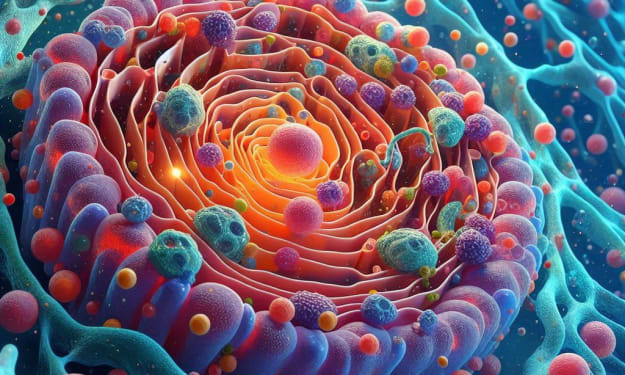"The Top 7 Causes of Your Constant Hunger"
Understanding the Factors That Contribute to a Never-Ending Appetite

By the way, if you are interested in Healthy Nutrition CLICK HERE
Do you find yourself feeling hungry all the time, no matter how much you eat? This can be frustrating and even discouraging, especially if you're trying to maintain a healthy weight or eat a balanced diet. But the good news is that there are several reasons why you might be experiencing constant hunger, and many of them can be addressed with simple lifestyle changes. In this article, we'll explore the top 7 causes of your constant hunger and offer tips for managing your appetite.
Lack of Sleep
One of the main causes of constant hunger is a lack of sleep. When you don't get enough sleep, your body produces more of the hormone ghrelin, which stimulates appetite, and less of the hormone leptin, which signals fullness.
This hormonal imbalance can cause you to feel hungry more often, even if you've recently eaten.
In addition to affecting appetite, sleep deprivation can also increase cravings for high-carbohydrate, high-fat foods. Studies have shown that people who don't get enough sleep tend to eat more junk food and consume more calories overall.
To combat the effects of sleep deprivation on hunger, aim for 7-8 hours of sleep each night. If you have trouble sleeping, try establishing a bedtime routine, limiting caffeine and alcohol intake, and creating a calm and relaxing sleeping environment.
Low-Fiber Diet
Another cause of constant hunger is a low-fiber diet. Fiber is an essential nutrient that helps to slow digestion and keep you feeling full. If you're not getting enough fiber in your diet, you may experience hunger more frequently.
To increase your fiber intake, make sure to include plenty of fruits, vegetables, whole grains, and legumes in your meals. These foods are rich in fiber and can help to keep you feeling full and satisfied. You can also consider taking a fiber supplement if you're having trouble meeting your daily needs.
Dehydration
Dehydration can often be mistaken for hunger, as thirst and hunger signals are processed in the same part of the brain. When you're dehydrated, your body may send signals that you interpret as hunger, even if you've recently eaten.
To avoid confusing thirst with hunger, make sure to drink plenty of water throughout the day. The general recommendation is to drink at least 8 glasses of water per day, but your individual needs may vary depending on factors such as age, gender, and activity level.
Skipping Meals
Skipping meals is another common cause of constant hunger. When you skip a meal, your blood sugar levels drop, which can lead to feelings of hunger and low energy. This can cause you to overeat at your next meal, leading to a cycle of overeating and hunger.
To avoid the negative effects of skipping meals, make sure to eat regular, balanced meals throughout the day. This will help to keep your blood sugar levels stable and prevent feelings of hunger and fatigue. You can also consider packing healthy snacks to eat between meals to keep your energy levels up and prevent overeating.
Emotional Eating
Stress, anxiety, and boredom can all lead to emotional eating, which can cause you to eat more than you need. Emotional eating can be a difficult habit to break, as it often involves using food to cope with difficult emotions or situations.
To avoid emotional eating, try to find alternative ways to cope with stress and boredom. This could include exercise, meditation, talking to a friend, or engaging in a relaxing activity such as reading or listening to music. It may also be helpful to keep a food diary to track your emotions and identify triggers for emotional eating.
Medications
Certain medications can increase appetite as a side effect. This is particularly true for medications that affect the hormones that regulate appetite, such as antidepressants and some medications used to treat diabetes. If you're taking medication and experiencing constant hunger as a side effect, talk to your healthcare provider about alternative medications or strategies for managing your appetite.
Hormonal Imbalances
Hormonal imbalances can also contribute to constant hunger. Conditions such as polycystic ovary syndrome (PCOS) and thyroid disorders can affect the hormones that regulate appetite, causing you to feel hungry more often.
If you suspect that a hormonal imbalance may be contributing to your constant hunger, talk to your healthcare provider about getting tested. Treatment for hormonal imbalances may include medication, lifestyle changes, or hormone therapy.
Managing Constant Hunger
If you're experiencing constant hunger, there are several strategies you can use to manage your appetite and feel more satisfied:
Eat a Balanced Diet
Eating a balanced diet that includes plenty of protein, fiber, and healthy fats can help to keep you feeling full and satisfied. Make sure to include a variety of nutrient-dense foods in your meals and avoid processed and high-sugar foods that can cause blood sugar spikes and crashes.
Stay Hydrated
Drinking plenty of water throughout the day can help to prevent dehydration and reduce feelings of hunger. Aim for at least 8 glasses of water per day, and consider adding foods with high water content, such as cucumbers and watermelon, to your meals.
Get Enough Sleep
Getting enough sleep is important for regulating hormones that affect appetite. Aim for 7-8 hours of sleep each night, and establish a relaxing bedtime routine to help you wind down and prepare for sleep.
Avoid Skipping Meals
Skipping meals can lead to feelings of hunger and overeating. Make sure to eat regular, balanced meals throughout the day, and consider packing healthy snacks to eat between meals.
Manage Stress and Emotions
Stress, anxiety, and boredom can all contribute to emotional eating and overeating. Find healthy ways to manage stress and emotions, such as exercise, meditation, or talking to a friend.
Consider Hormonal Imbalances
If you suspect that a hormonal imbalance may be contributing to your constant hunger, talk to your healthcare provider about getting tested and exploring treatment options.
Conclusion
Constant hunger can be a frustrating and challenging issue to deal with, but by understanding the causes and implementing strategies to manage your appetite, you can feel more in control of your hunger and achieve your health goals. Remember to prioritize a balanced diet, hydration, sleep, and emotional well-being, and seek help from healthcare professionals if needed.
About the Creator
Bryan Daug
Good day! As a writer, I strive to create engaging and thought-provoking content that will captivate my readers from the very first sentence. Whether you're looking for inspiration, entertainment, or information.
Enjoyed the story? Support the Creator.
Subscribe for free to receive all their stories in your feed. You could also pledge your support or give them a one-off tip, letting them know you appreciate their work.






Comments
There are no comments for this story
Be the first to respond and start the conversation.